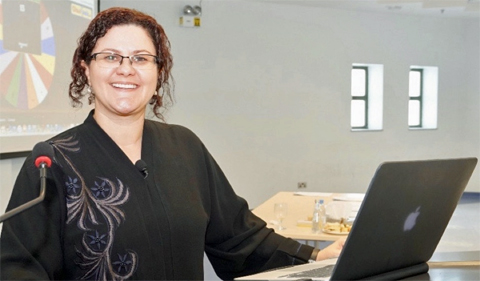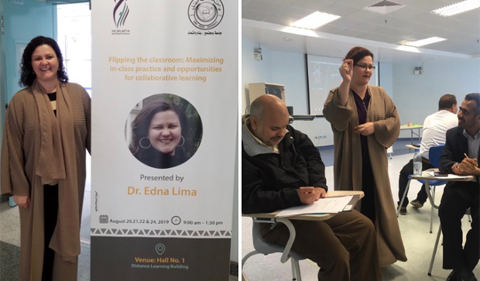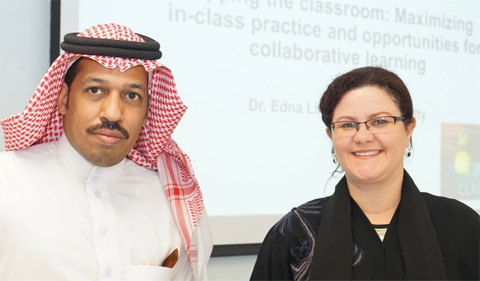Dr. Edna Lima spent over a week in Saudi Arabia in August giving workshops on “Flipping the classroom: Maximizing in-class practice and opportunities for collaborative learning” at King Faisal University.
Lima is Assistant Professor of Instruction in the English Language Improvement Program at Ohio University.
Lima was invited by the dean of Development and Quality Assurance to participate in the university’s second enrichment program. The invitation was based on the impression she had made on a KFU linguistics professor back in 2017 as part of the OHIO Group – KFU new faculty mentoring program. That professor was so happy with Lima’s mentoring that he went to the dean and told him that he had to invite her to the enrichment program, which provides professional development for King Faisal University’s 2,000 professors in the weeks prior to the beginning of the academic year.
KFU professors must attend at least four workshops during the two weeks. Workshops in the morning are in English, while afternoon workshops offer similar topics but are in Arabic. Lima’s workshop was one of six workshops on either pedagogy or research offered in English. Trainers repeat their workshop each day for four consecutive days. In the second week, a new group of trainers comes in to offer new workshops.

Edna Lima in the classroom wearing her abaya. The screen shows a name picker, which Lima uses to pick student names at random for presentations.
Lima’s workshop attracted 176 faculty members over the four sessions.
“I was excited to get so many given there were so many competing workshops,” Lima said. The attendees were faculty from every possible department in the university: medicine, dentistry, agriculture, engineering, physics, mathematics, education, law, finance, linguistics, and so on. Eight of the professors had been to Ohio and one had even studied at OHIO University.
“It was very exciting to have professors as trainees,” Lima said. “There were very important professors (and deans) in my workshops who have been there for a long time, who told me that I had enlightened them. I got emails and thank you notes. It was fabulous.”
After one workshop, a female professor asked her: “Are you like that all the time? Do you teach like that for every class? How do you do that? You are so active and energetic.” Lima, whose workshop examples were all based on her own flipped ELIP classes, responded with a resounding, “Yes, this is what I do every day. I’m a teacher. I love what I do, so I am always this excited in class no matter what.” “Amazing!” the female professor responded. For Lima, it was a great compliment coming from someone of that experience, coming from another country.

Edna Lima talks with, President of King Faisal University Dr. Mohammed bin Abdul Aziz Al-Ohali (second from left), and his assistants.
Lima was happy to see that the KFU dean would expose the faculty to such innovative approaches like the flipped classroom, where the traditional lecture is replaced by engaging and to-the-point materials (e.g., video lectures) that students access and study beforehand. Class becomes the place to engage in collaborative learning and problem-solving activities. Lima found that the professors reacted to the flipped model in different ways. Some were very open to the idea, and some were less receptive for a variety of reasons (e.g., standardized syllabi for several sections of the same course do not allow for substantial changes to individual sections).
“But I had an older professor, who had already retired but had come back to teaching agriculture,” Lima said. “And he was so excited in that workshop.”
“‘That’s what I do with my students,” he said. “I teach them in the classroom, and then I send them in the field to perform real farm work. I do that. This is the best way of teaching.”
“That was very encouraging,” Lima said, noting that all the participants in her workshop were open to her ideas and attentive for all the four and half hours of training time.

Left, Lima stands next to the poster for her workshop. Right, Lima works with two of the professors in her workshop.
And what did Lima learn from her time in Saudi Arabia?
“It was a fantastic experience to learn about a different culture, and a different system. I was very impressed about how friendly and nice people were, and how well I was treated,” she said.
Lima was surprised by how late people stay up. She learned that because of the heat during the day (48-52 degrees Celsius in August), people go out at night. “At 1 a.m. in the morning, ladies are all over the city shopping and doing things and going to the wonderful coffee shops. There are mixed coffee shops there,” she said.
Female professors were in the same classroom as the men, although they were separated by a screen. Lima was asked to stay in one spot at the front of the class so that she could be seen by all the class, something that the “active” Lima found hard to do. Lima loved the food and drinks, especially the specialty coffee and desserts. But most of all, she loved wearing the abaya and ended up buying a few to bring back. She hopes to be able to wear them again sometime soon.



















One Comment